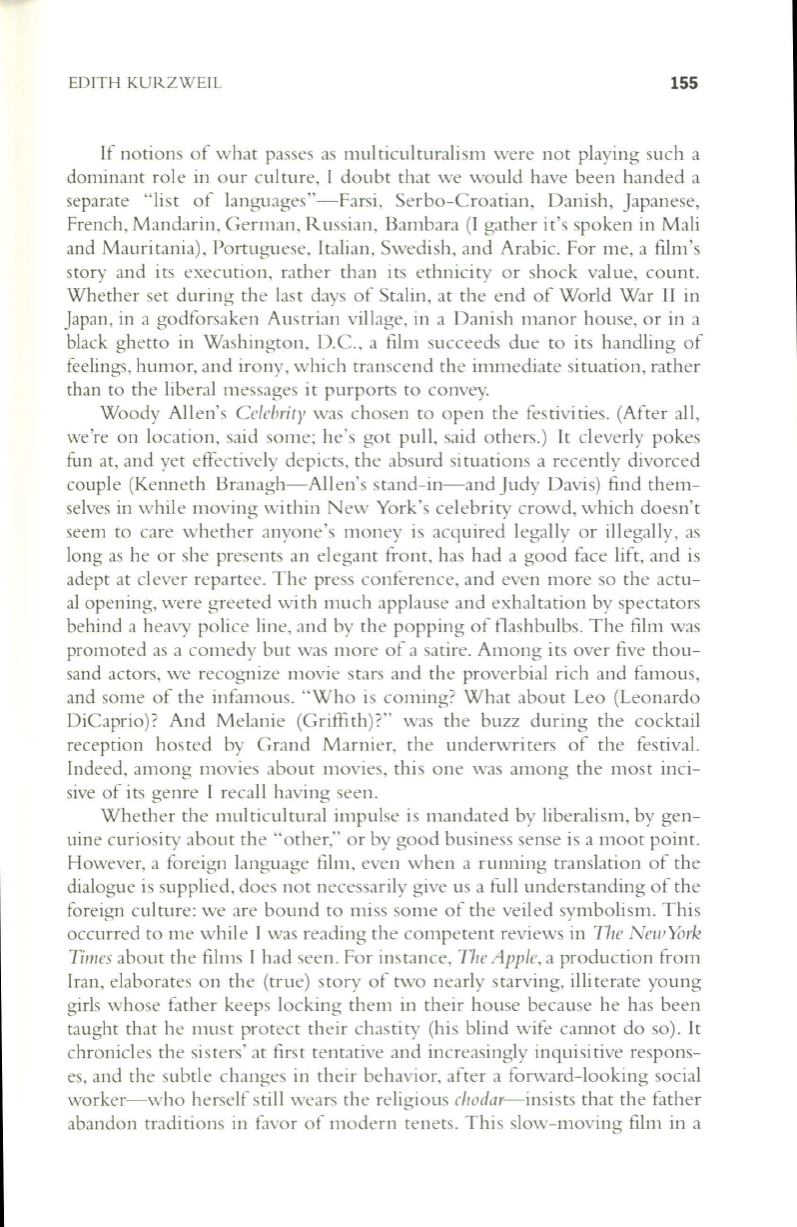
EDIT H KU R ZWEI L
155
If no ti ons of what passes as multi culturali sm were no t playing such a
dominant role in our cui ture, I do ubt that we would have been handed a
separate "li st o f languages"-Farsi, Serbo-Croa tian, D ani sh, Japanese,
French, Mandarin , German, Russian, Bambara (I ga ther it's spo ken in Mali
and Mauritani a), Po rtu guese, Itali an , Swedi sh, and Arabi c. For me, a film 's
story and its execution , rath er than its ethni city or shock valu e, count.
Whether set during the las t days o f Stalin , at the end of Wo rld War II in
Japan, in a godforsa ken Austrian village, in a Dani sh mano r house, o r in a
black ghetto in Was hin gto n,
D. c.,
a film succeeds due to its handling of
feelings, humo r, and iro ny, w hi ch transcend th e immedi ate situation , rather
than to the liberal messages it purpo rts to convey.
Woody All en's
Celebrit y
was chosen to open the fes tivities. (After all ,
we're on loca ti o n, said some; he's go t pull, sa id o thers.) It cl everly pokes
fun at, and ye t effec tivel y depi cts, the absurd situati o ns a recently divorced
coupl e (Kenn eth Branagh- All en's stand- in-and Judy D avis) find them–
selves in whil e mov ing w ithin New Yo rk's celebri ty crowd , whi ch doesn't
seem to ca re w hether anyone's mo ney is acquired legall y or ill egally , as
long as he or she presents an elegant fr ont, has had a good face lift, and is
adept at cl ever repartee. Th e press conference, and even mo re so the actu–
al opening, were greeted with much applause and exhaltatio n by spec tato rs
behind a heavy poli ce line, and by th e popping of flashbulbs. The film was
promoted as a comedy but was more o f a sa tire. Amo ng its over five tho u–
sand acto rs, we recogni ze movie stars and the proverbi al ri ch and famous,
and some of th e in famous. "Wh o is coming? What about Leo (Leonardo
DiCapri o)? And Melani e (G riffith)?" was the buzz during th e cocktail
reception hos ted by G rand Marni er, th e underwriters o f th e fes tival.
Indeed, among movies abo ut movies, thi s one was amo ng the mos t inci–
sive of its genre I reca ll hav ing seen .
Wheth er the multi cultural impulse is mandated by liberali sm, by gen–
uine curi osity about the "other," o r by good business sense is a moot point.
Howeve r, a foreign language film , even when a running translation o f th e
dialogue is suppli ed , does no t necessa rily give us a full understanding of th e
foreign culture: we are bound to mi ss some o f the ve il ed symboli sm. Thi s
occurred to me whil e I was reading the competent reviews in
The New Yark
Times
about the films I had seen . Fo r instance,
TheApple,
a production from
Iran, elabora tes o n the (tru e) sto ry o f two nea rly starving, illiterate young
girls whose fa th er keeps locking them in their house because he has been
taught that he must pro tect their chas ti ty (hi s blind w ife ca nn o t do so). It
chronicl es th e sisters' at first tentative and increasingly inqui sitive respons–
es, and the subtl e changes in th eir behavio r, after a forward-l ooking social
worker-who herse lf still wears the religio us {hadar-insists that the fa ther
abandon traditi ons in favo r of mode rn tenets. T hi s slow-moving fil m in a


